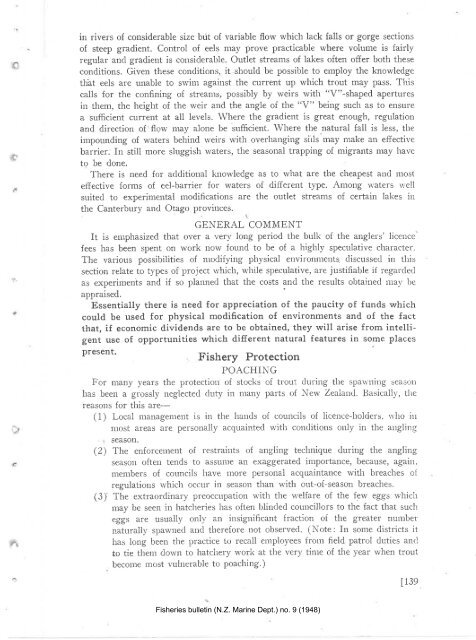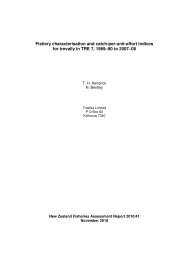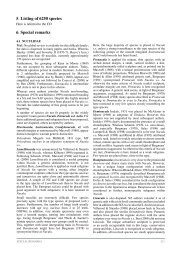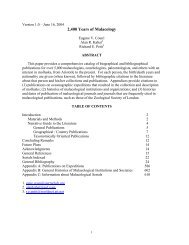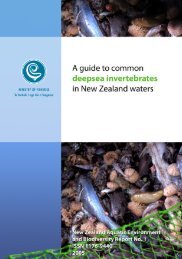N.Z. MARINE DEPARTMENT-FISHERIE,S BULLETIN No. .į
N.Z. MARINE DEPARTMENT-FISHERIE,S BULLETIN No. .į
N.Z. MARINE DEPARTMENT-FISHERIE,S BULLETIN No. .į
Create successful ePaper yourself
Turn your PDF publications into a flip-book with our unique Google optimized e-Paper software.
,.)<br />
in rivers of considerable size bút of variable flow which lack falls or gorge sections<br />
of steep gradient. Cor-rtrol of eels may prove practicable where volume is fairly<br />
legular ancl gradient is considerable. Outlet streatns of lakes often offer both these<br />
conditions. Given these conditions, it should be possible to employ the knowledge<br />
thãt eels are unable to slvirn aga.inst the current up which trout may pass. This<br />
calls for the confining of streams, possibly by weirs with "V"-shaped apertures<br />
in them, the height of the weir ancl the angle of the "V" being sucl-r as to ensure<br />
a sufÊcient current at all levels. Where the gradient is great enough, regulation<br />
and direction of flow may alone be sufñcient. Where the natural fall is less, the<br />
ir-npounding of waters behind rveirs with overhanging siils may make an effective<br />
barrier. In still more sluggish waters, the seasonal trapping of migrants may havc<br />
to be done.<br />
There is need for additional knowledge as to what are the cheapest antl most<br />
elïective forrns of eel-barrier for waters of different type. Among waters $'el1<br />
suited to experimer-rtal modifications are the outlet streams of certain lakes irr<br />
the Canterbury and Otago provinces.<br />
GE}trERAL COMMENT<br />
It is emphasized that over a very lor.rg period the bulk of the anglers' liccuce<br />
fees has been spent on w'ork nor'v found to be of a highly speculative character.<br />
The various possibilities of mo.Jifying physical environurents cliscttssecl in this<br />
section relate to ¡1'pes of project rvhich, while speculative, are justifiable i{ regarcled<br />
as experiments and if so plar-urecl that the costs and the lesults obtainecl may be<br />
appraisecl.<br />
Essentially there is need for appreciation of the paucity of funds which<br />
could be used for physical modification of environments and of the fact<br />
that, if economic dividends are to be obtained, they will arise from intelligent<br />
use of 'opportunities which different natural features in some places<br />
present.<br />
Fis.hery Protection<br />
POACHII{G<br />
For rnany years the protectiorLr of stocks of trout during the spar,r'uing seasoll<br />
lras been a grossly neglectecl duty in many parts of New Zealand,. Basiczrlly, the<br />
reasolls for this are-<br />
( 1) Local management is in tl-re hands of couucils of licence-holders. rvho iu<br />
nìost areas are personalll' a.,tuu'tlred with conditions only in the augling<br />
season.<br />
(2) The enforcernent of restraints of angling technique during the angling<br />
seasolr often tends to assume an exaggerated ilnportattce, because, again,<br />
members of councils have more personal acqr:aintance rvith breaches oi<br />
regulations lvhich occur in season than lvith ont-of-season breaches.<br />
(3) The extr-aordinary preoccrlpation with the u'elfare of the few eggs which<br />
may be seen in hatcheries has often blir-rded cour-rcillors to the fact that such<br />
eggs are usually onlv an insignificant fraction of the greater nutnbernaturaliy<br />
spar,vnecl ancl therefore not observecl. (<strong>No</strong>te: In some districts it<br />
has long been the practice to recall employees irorr field patrol duties ar-rci<br />
to tie tl-rem down to hatchery work at the very tinle of the year when trout<br />
becoue most vulnerable to poaching')<br />
Fisheries bulletin (N.Z. Marine Dept.) no. 9 (1948)<br />
lr3e


